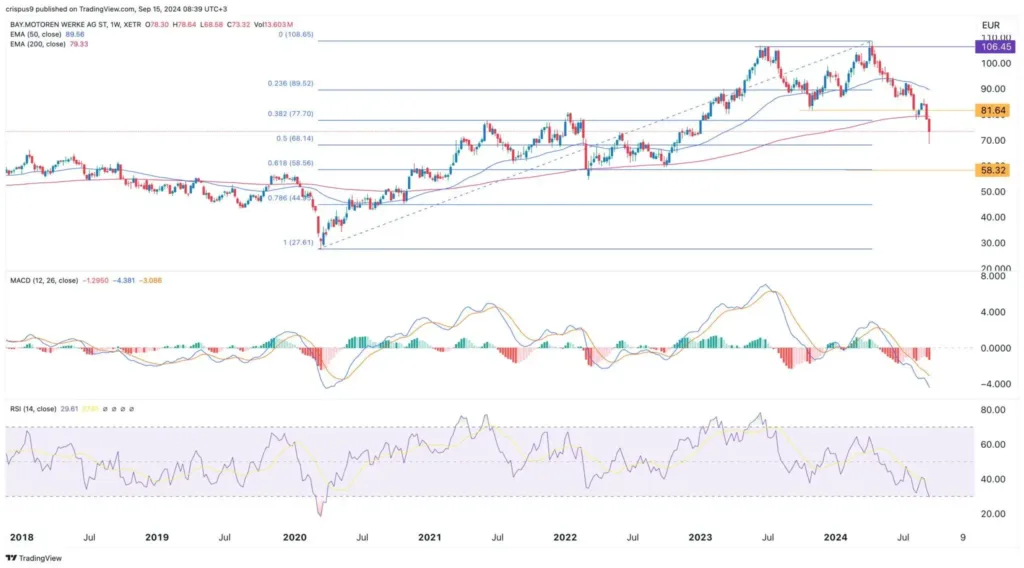BMW Share Price: Rolls-Royce Parent Faces Bearish Trends

- BMW stock has created a double-top pattern on the weekly chart, signaling potential bearish movement.
- The company is facing growing challenges as competition in the auto industry intensifies.
- Sales of Rolls-Royce and Mini are declining as global demand slows.
The BMW share price has been on a steep decline as the auto industry faces headwinds. The stock has fallen for three consecutive weeks, hitting its lowest point since January 2023. With a 32% drop from its highest level this year, BMW is now firmly in bear market territory.
Are you looking for the best trading platform? Sign-up to the best trading platform for you for FREE. Takes 2 mins.
The New Reality for the Auto Industry
The global auto industry is experiencing a transformation, as growth in the electric vehicle (EV) market slows and China emerges as a dominant player.
A decade ago, China was a relatively small player in auto manufacturing. Today, companies like BYD, backed by Warren Buffett, have become industry giants. In fact, China recently surpassed Japan as the world’s largest vehicle exporter.
Most importantly, traditional Internal Combustion Engine (ICE) manufacturers are struggling to compete with new EV companies like Tesla, BYD, and Rivian.
In the United States, automakers like Ford and General Motors have been forced to scale back their EV production goals. The same trend is evident in Germany, where the EV models produced by BMW, Volkswagen, and Mercedes have struggled to gain traction.
This pressure has led to steep declines in automobile stocks, with major players like Stellantis, Ford, General Motors, and Volkswagen all seeing their shares plummet over the past few months.
BMW Faces Mounting Challenges
As the parent company of Mini and Rolls-Royce, BMW is grappling with significant challenges as growth in key markets like China and Europe slows.
These issues have also impacted Volkswagen, another German giant, which recently announced plans to close factories in Germany for the first time in decades.
BMW’s most recent financial results reflect this slowdown. The company reported a 0.7% decline in total revenue for the second quarter, bringing it to €32.9 billion. For the first half of the year, revenues fell by 0.7% to €73.5 billion.
This revenue drop was largely due to eliminations, which cost the company €5.8 billion. However, BMW’s automotive division managed a 1.4% increase in revenue to €32 billion, while its financial services division grew by 10.8% to €9.7 billion.
While BMW is performing better than Volkswagen, it still faces significant profit pressures due to rising costs. As a result, group profit dropped by 10.7% in Q2, totaling €3.8 billion, while first-half profits declined to €7.93 billion. The company also cut its guidance, contributing to the stock’s sharp decline.
BMW delivered 565,490 vehicles under its flagship brand in the last quarter, a 2.2% increase. However, Mini and Rolls-Royce units saw steep declines of 27% and 16%, respectively.
Catalysts and Challenges for BMW
BMW remains one of the world’s most recognized automobile brands, with a strong global presence.
The key catalyst for BMW’s continued success is its strong legacy in the ICE vehicle market. Many analysts believe BMW should focus on maintaining its leadership in the ICE segment rather than committing substantial resources to the EV space.
One potential strategy for BMW could be leveraging its strong balance sheet to acquire undervalued Chinese EV manufacturers like Nio and Li Auto, which have market valuations of $11.5 billion and $20 billion, respectively.
Such an acquisition could allow BMW to maintain its dominance in the ICE market while gaining a foothold in the growing EV sector.
BMW also stands out for its undervalued stock compared to its peers. The company is currently trading at a 3.9x free cash flow and a 2.16 forward earnings multiple, with a price-to-book ratio of 0.52.
The stock is likely undervalued because investors expect weaker demand in the coming years as the industry navigates difficult times. However, on the bright side, BMW offers a dividend yield of 8.01%, which is higher than what General Motors and Ford offer.
BMW Share Price Technical Analysis

On the weekly chart, BMW’s stock price has formed a double-top pattern around the €106 level, which is a strong bearish signal in technical analysis.
The stock has dropped below its neckline at €81.65, which was the lowest point in October last year. It has also fallen below both the 50-week and 200-week moving averages, as well as the 38.2% Fibonacci Retracement level.
Additionally, the Relative Strength Index (RSI) and the MACD indicators continue to fall, suggesting that BMW’s share price could decline further. The next key level to watch is the 61.8% retracement level at €58.32, which could be the stock’s next major support.
S&P 500 Hits Record High; Dow Gains as Longboard Pharmaceuticals Surges 51% and Tech Stocks Rise S&P 500 Reaches Record
S&P 500, Dow Notch Record Closing Highs as Crude Slumps Major Indexes Set Record Highs: The S&P 500 and Dow
Should You Buy Plug Power Stock While It’s Trading Below $4? A Closer Look at the Hydrogen Pioneer’s Future Plug
MicroStrategy Stock Rises 550% in 2024: Should You Invest? MicroStrategy (NASDAQ: MSTR) has been one of the top-performing stocks in
One of Tesla’s Biggest Bulls ‘Disappointed’ After Robotaxi Event Tesla’s much-anticipated Robotaxi event left one of its most ardent supporters
